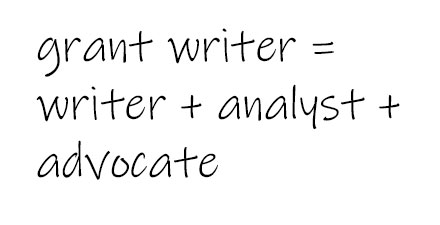What it takes to secure a major private grant

For those of us who work with private foundations, grant writer has become a bit of a misnomer. Outside of some select circumstances, robust proposals can be rarities. Your initial introduction to funders is likely to take the form of a few 200-word text boxes. Yes, it takes skillful writing to take a complex program and chisel it into those pithy narratives, but with so few words, the content of that text becomes even more important than the quality.
If there’s something to be said for the online, abbreviated age of grant writing, it is that fluff is out. A plainspoken proposal with simple, short words and sentences is likely to win the day. Although basic business writing skills are not as ubiquitous as most of us would like, they do exist in most nonprofit offices. The question that vexes my clients these days is this: with so little space to make our case, what should we include, and what do we omit?
Grant writers are giving way to a more diverse set of roles. These are three of the most core skill sets in modern grant officers’ jobs:
- Analyst. A grant professional’s job is to understand what a specific foundation prioritizes. So, although your organization might have some terrific attributes, which of them will matter to this funder at this time? A grant professional no longer has the luxury of including all of the gems about their organization and its programs. They must have a keen awareness of priority and relevance.
- Advocate. Maybe the least-appreciated skill is one of recognizing that your organization does not possess the requisite relevance for a particular foundation—and vocalizing it. Not all workplaces are open enough to build on this feedback: “We might not be ready for this now,” or “Here’s what we can do to make ourselves more competitive.” A smart nonprofit will absorb that input, both for efficiency’s sake (it enables focus on more promising proposals) and better positioning for future grants. Most of the elements that stand to improve one proposal will strengthen them all.
- Writer. Yes, in part, it’s still about the writing. There’s just less of it to do. I recently walked a client through an initial submission to a sizable foundation that required just 800 characters—including spaces—to describe a large, national project. That took three people about an hour to finalize. Let’s be clear: it’s not easy to write succinctly, but the bulk of the work takes place in the lead-up to the writing phase and focuses heavily on the previous two roles.
When you sharpen the skills that lead to the absolute key points you want funders to know, you’ll be in a very good position to perfect that succinct online application.
If you’d like to learn how to engage with large funders, I’ll be leading “The Big Fish: Launching, Growing, or Propelling Your Major Grants Program” at Candid’s Washington, D.C., office on April 14. Register now







Patricia Napolitano says:
As a Manager of Grants and Due Diligence at a small private foundation I've been looking for articles and grant samples to tweak our own grant application and came across your article. Instead of just looking at this from the 'grantor' vision, I thought that seeing it through the 'grantee' side would be helpful. Not brand-new, but still 'new' to the philanthropic world we are learning and evolving every year here and what we see is that we need to change our application after each grant cycle due to not getting the exact answers to our questions as we hoped. We either get too little information on the 'project' the funds are being asked for, or waaayyyy too much general information on the organization as a whole, without ever getting enough (again) on the 'project'. This blog and the follow up comments were helpful. We are an 'invitation only' grantor and tend to seek out smaller organizations that assist the vulnerable populations that might be overlooked; but we do our own research prior to sending out the invitation, as well as a possible phone call to discuss their needs. We realize that the person writing the grant application (and as of last year it is an on-line grant application format) is wearing many hats and often may not be prolific in this skill. I will take this blog and comments into consideration when (again) tweaking our application.
LJ says:
I would suspect you have trouble finding this for two reasons: 1) many grants don't allow for the payment of staff/contractors, but are focused on direct services to clients, capital needs, etc., and 2) people have to be paid for their work even if a grant isn't awarded. A grant writer will put hours into a proposal and then it may not be awarded through no fault of their own; the quality may be excellent, but it's still not funded for one or more of a variety of reasons out of their control -- but that person still needs to earn a living, just like the rest of us. Hope that helps.
William Silverthorn, Latin American Missions Association says:
My impression is that doing grant writing for a percentage is deemed to be unethical so that is why there are no writers out there that will work on that basis. At least that is what I was told by one.
I would like to be in touch with a writer for our 501c3 non-profit.
Thomas S. Mignogna says:
A sample of a well crafted Grant would be helpful.
Hailey Bailey says:
Hi Brandee,
Not sure about grant writers that request a percentage of the grant if funded but I do know of professionals, myself included, that do freelance grant writing for either an hourly or per proposal fee.
Jordan Dancer says:
Thank you. I have been trying so long and hard to get this message out to my leadership team. How rewarding to see your article - which I will share with them.
Brandee Lukas says:
I heard there used to be actual grant writers out there that you could use that would just require a percent of payment of the grant that they get for you. I have had no luck what so ever finding anyone out there close to do this for our non-profit. Are they out there or???
Courtney Franklin says:
This is great. After getting into the profession 12 years ago, I realized I really dislike the title "grant writer." A grant is a funding mechanism, not the document we prepare. At the very least, the title should be "grant proposal writer," but even then it fails to encompass all that we do - analyze, advocate, etc. It would be like calling a Major Gift Officer a "donation talker."
Stacie Levao says:
Great article! Love the call out to knowing when your organization doesn't fit the grant...yet. So many people can become much more efficient and effective when they are able to weed out what doesn't work for them. Applicable in lots of areas of life, too!
heather van Wyk says:
Dear Susan
Thank you for touching on such an important and frustrating element of our work. I have been a grant writer for many years for several major NGOs in South Africa. Every year the applications seem to get shorter and shorter - they may as well put a picture of a postage stamp on their website and tell me to write a 15 page proposal on that.
However, it does force us as writers to cut directly to the chase not only with the funder but also with our internal staff who tend to write reams that will never be read.
I also believe that people give to people and not to organisations and even if the proposal is short it should have elements of passion and conviction and not only be about the numbers as I believe this is what the reader (potential funder) will pick up on.
Heres hoping I can join your session on Feb 27, from sunny Cape Town, South Africa